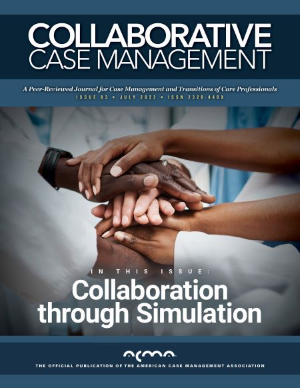Publication for Case Management Professionals

Collaborative Case Management is a peer reviewed quarterly publication for health delivery system and transitions of care (TOC) case management professionals. Articles focus on solutions to current issues - successful strategies, innovative interventions, effective tools - the education needed by Case Managers and Physician Advisors to enhance their practice. Articles are written and edited by nurses, social workers, physicians, educators and administrators in the case managment field. Through this publication, ACMA continues its commitment to supporting the evolving practice of Health Delivery System Case Management.
Aims and Scope
The Collaborative Case Management journal (CCM) aims to advance the field of case management by publishing high-quality, peer-reviewed articles that provide innovative insights into the interdisciplinary practice of case management across diverse health care settings. The journal focuses on collaborative approaches that enhance patient outcomes, streamline health care delivery, and foster communication among health care professionals. CCM seeks to publish original research, case studies, reviews, and commentary that address the challenges and opportunities within the field, including care coordination, patient advocacy, health policy, and technology integration in case management.
Editorial Policies
The Collaborative Case Management Journal adheres to the highest standards of academic integrity and publishing ethics. All submissions undergo a rigorous initial screening by the editorial team to ensure they align with the journal’s aims and scope. Manuscripts that pass this screening are subjected to double-blind peer review. The editorial team reserves the right to reject manuscripts at any stage of the review process if they do not meet the journal’s standards. The journal is committed to transparency and fairness in the publication process and follows guidelines set forth by the Committee on Publication Ethics (COPE).
Peer Review Process
The Collaborative Case Management journal employs a double-blind peer review process, ensuring that both the authors’ and reviewers’ identities are concealed throughout the review. Each manuscript is reviewed by at least two experts in the field. Reviewers assess the manuscript's originality, methodology, clarity, and relevance to the field of case management. Based on the reviewers' feedback, the editorial team makes a final decision, which can be acceptance, minor revision, major revision, or rejection. The journal strives to provide authors with constructive feedback to improve their work, whether or not it is ultimately accepted for publication.
Policies on Research Ethics, Conflict of Interest, Human and Animal Rights, and Informed Consent
The Collaborative Case Management journal requires all authors to disclose any potential conflicts of interest that could influence the research or interpretation of their findings. Authors must include a statement in their manuscript declaring any financial, personal, or professional affiliations that could be perceived as a conflict of interest. For studies involving human or animal subjects, the journal mandates that authors comply with the Declaration of Helsinki and relevant institutional and national guidelines. Authors must obtain informed consent from all human participants and ensure that the rights and welfare of human and animal subjects are protected. A statement confirming the adherence to these ethical standards must be included in the manuscript.
Data Sharing Policy
The Collaborative Case Management journal supports the transparency and reproducibility of research findings. Authors are encouraged to share the data supporting their findings as supplementary material or through public repositories, where appropriate. Authors must include a data availability statement within their manuscript, outlining how and where the data can be accessed. In cases where data cannot be shared, authors should provide a clear rationale in their statement. This policy aims to facilitate further research and ensure the robustness of published studies.
Corrections, Retractions, Addenda, and Editorial Expressions of Concern (EEoC)
Corrections are issued when only a minor part of a paper has validity issues, ensuring that the article's scholarly integrity and original findings remain intact; typically, the original article is corrected and linked to a notice detailing the error. Retractions occur when the data or content is so fundamentally flawed that it could alter the paper's findings and conclusions; in this case, a retraction notice is published in the next available issue and online. Retractions are rarely used since Collaborative Case Management does not knowingly publish articles with integrity issues. Addenda are published rarely when authors unintentionally omit significant information available at the time of publication, and such additions are made only if the editors deem them essential for the reader's understanding. An editorial expression of concern (EEoC) is a notification from a journal editor or publisher indicating potential issues with the integrity of a published article. While EEoCs are neither retractions nor corrections, they serve to inform readers of possible publication problems. EEoCs are rarely used since Collaborative Case Management does not knowingly publish articles with integrity issues.
For article submission guidelines, please view this document.
For advertising/commercial inquiries, please contact ACMA at sgreenwood@acmaweb.org.
View the media guide and advertising opportunities
For academic/reprint inquiries, please contact theacma@acmaweb.org.
Publicly Available Articles
Click here to access free publication articles.
Access the Current Issue
The most current issue of Collaborative Case Management, along with access to the publication's archive, is available to ACMA Members in the Member's Only Section.